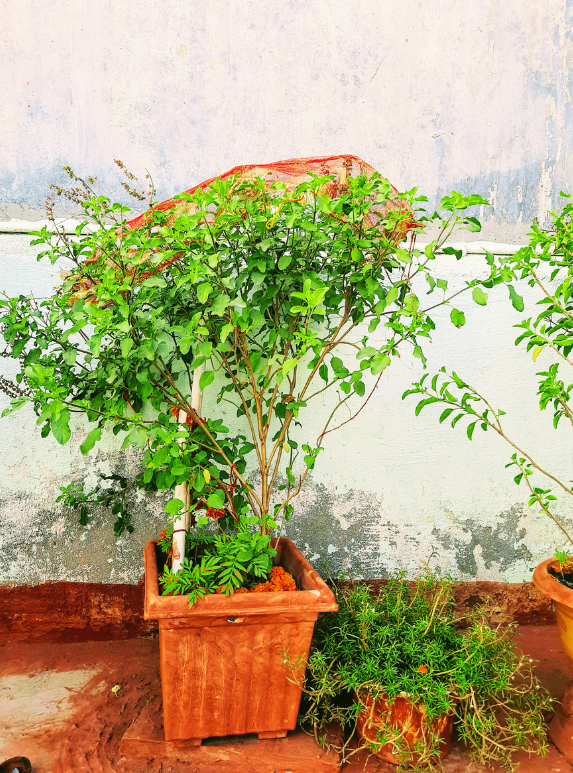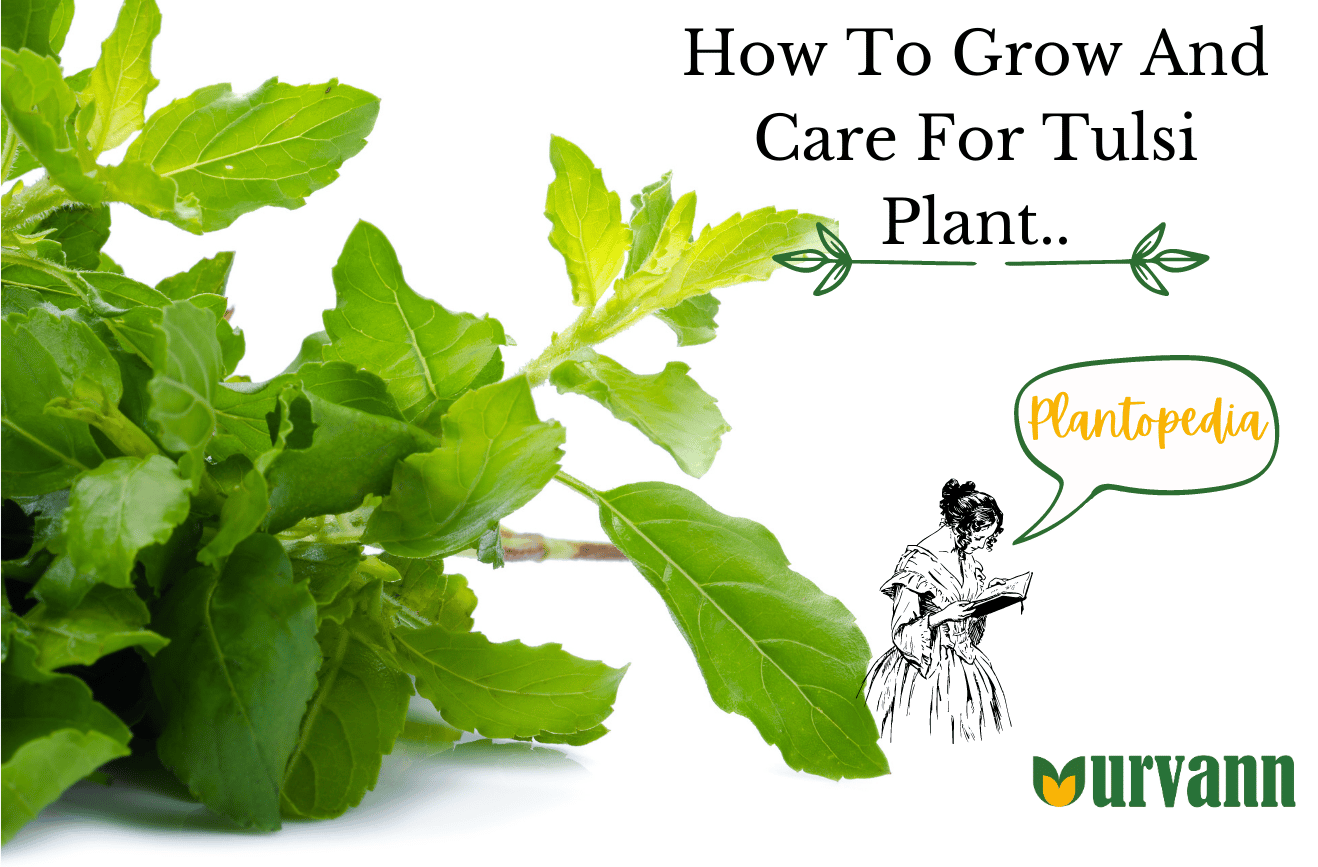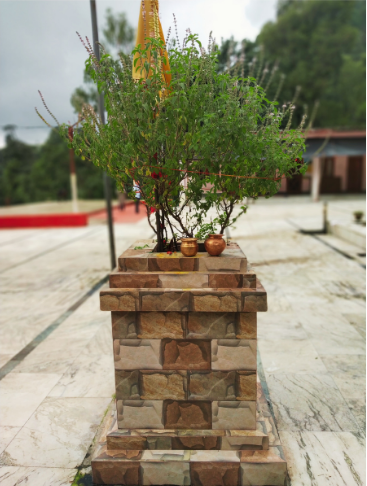Holy basil, also called tulsi, is a flowering plant of the mint family grown for its aromatic leaves and ayurvedic properties. The plant is widely used in Ayurvedic and traditional medicine and is sacred in Hinduism. It is commonly used as a herbal tea for a range of diseases. There have been numerous scientific research on holy basil advantages that claim that it has antioxidant, antibacterial, antiviral, anticancer, immune-stimulating, and adaptogenic (stress-relieving) qualities. It helps to support the body's natural defenses against infections, stress, and different illnesses.
WATER, SUNLIGHT & SOIL CARE NEEDS OF TULSI PLANTS
Watering- Water the plant when the top one inch of soil is dry, but in summer, keep the soil slightly moist. Do not water during rain. Reduce watering by the winter to prevent diseases.
Sunlight- Holy basil thrives in indirect bright light and at least four hours of sunlight a day is required for the best growth. As per vastu, it should be kept in north or north-east direction.
Ideal soil mix- Tulsi grows well in loamy and fertile soil with good drainage.
Pruning- In order to get more and bigger leaves, deadhead the flowers from the top of the steams and distribute these in the soil to propagate more tulsi plants.
PESTS AND DISEASES
Holy basil is not prone to serious pests or plant diseases. In some exceptions, it can attract minor pests that can easily be eliminated with pesticides. You can also use neem-based fertilizer to stay organic.
WHY IS TULSI CONSIDERED SACRED IN HINDUISM?

- The tulsi plant, also known as Indian basil, is a significant emblem in Hinduism. Tulsi means "the incomparable one" in Sanskrit. Several tales and legends recorded in the Puranas, or ancient books, relate to the origins of tulsi's significance in religious rites.
- Tulsi is a sacred plant in Hinduism, and Hindus worship it in the morning and evening.
- Tulsi is regarded as the earthly manifestation of goddess Lakshmi, making it the most sacred plant for Hindus. Tulsi is reported to be an ardent Krishna admirer who Radha cursed to become a plant, according to some legendary stories.
- Every home with a Tulsi plant is considered a place of pilgrimage by Hindus, and death is forbidden to enter.
- Lord Vishnu is also said to be pleased when Tulsi or a garland made of Tulsi leaves is worshipped in Hindu tradition. Keeping this plant at home can invite good luck and prosperity.
10 MUST-KNOW MEDICINAL BENEFITS OF TULSI PLANTS
- Encourages healthy heart-Holy basil is high in vitamin C and antioxidants like eugenol, which protect the heart from free radical damage. Eugenol is also effective at lowering blood cholesterol levels.
- Anti-aging-Vitamin C and A, which are phytonutrients in Holy Basil, are powerful antioxidants that protect the skin from practically all free radical damage.
- Treating Kidney Stones-Tulsi is a mild diuretic and detoxifier that aids in the reduction of uric acid levels in the body. Holy Basil contains acetic acid, which aids in the breaking of stones.
- Headaches are relieved-Tulsi is a natural pain reliever that can also help with migraines.
- Acne is fought by Tulsi-Bacteria and diseases are killed by holy basil. The principal active ingredient in holy basil oil is eugenol, which aids in the treatment of skin conditions. Both internally and externally, it aids in the treatment of skin infections.
- Fever relief-Tulsi is a traditional fever-relieving herb. It is a key component in the composition of many ayurvedic medicines and home treatments.
- Optical Health-Tulsi's anti-inflammatory effects aid in the prevention of viral, bacterial, and fungal infections, which are harmful to the eyes. It also decreases stress and calms eye inflammation.
- Dental Care-Tulsi is an oral disinfectant and a natural mouth freshener. Mouth ulcers can also be treated with Tulsi. While also safeguarding the teeth, holy basil kills the microorganisms that cause dental cavities, plaque, tartar, and bad breath.
- Cure for Respiratory Issues-Tulsi heals viral, bacterial, and fungal infections in the respiratory system due to the presence of chemicals like camphene, eugenol, and cineole. It can treat bronchitis and TB, among other respiratory illnesses.
- Vitamin K is abundant in Tulsi- Vitamin K is a fat-soluble vitamin that is crucial for bone and heart health.
“Queen of herbs” has numerous medicinal and ayurvedic properties attached to it. Apart from its medicinal properties, the presence of tulsi plants also helps in eliminating stress from the surroundings. Additionally, keeping a tulsi plant at home brings harmony and happiness to the family, according to Vastu. And that’s basically the gist of it, tulsi is a low-maintenance plant, and hence growing it is super easy.
Happy Gardening!



1 Comment
Leave a Reply